语法复习--特殊句式(并列句)
特殊句式的类型
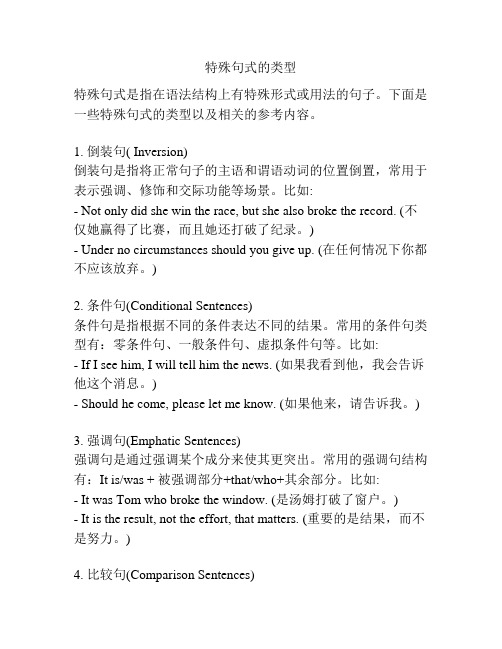
特殊句式的类型特殊句式是指在语法结构上有特殊形式或用法的句子。
下面是一些特殊句式的类型以及相关的参考内容。
1. 倒装句( Inversion)倒装句是指将正常句子的主语和谓语动词的位置倒置,常用于表示强调、修饰和交际功能等场景。
比如:- Not only did she win the race, but she also broke the record. (不仅她赢得了比赛,而且她还打破了纪录。
)- Under no circumstances should you give up. (在任何情况下你都不应该放弃。
)2. 条件句(Conditional Sentences)条件句是指根据不同的条件表达不同的结果。
常用的条件句类型有:零条件句、一般条件句、虚拟条件句等。
比如:- If I see him, I will tell him the news. (如果我看到他,我会告诉他这个消息。
)- Should he come, please let me know. (如果他来,请告诉我。
)3. 强调句(Emphatic Sentences)强调句是通过强调某个成分来使其更突出。
常用的强调句结构有:It is/was + 被强调部分+that/who+其余部分。
比如:- It was Tom who broke the window. (是汤姆打破了窗户。
)- It is the result, not the effort, that matters. (重要的是结果,而不是努力。
)4. 比较句(Comparison Sentences)比较句是用来比较两个对象或者描述相对关系的句子。
常用的比较句结构有:as+adj./adv. +as, not as+adj./adv.+as,more/less+adj./adv.+ than等。
比如:- He runs as fast as a cheetah. (他跑得像一只猎豹一样快。
语法复习--特殊句式(并列句)
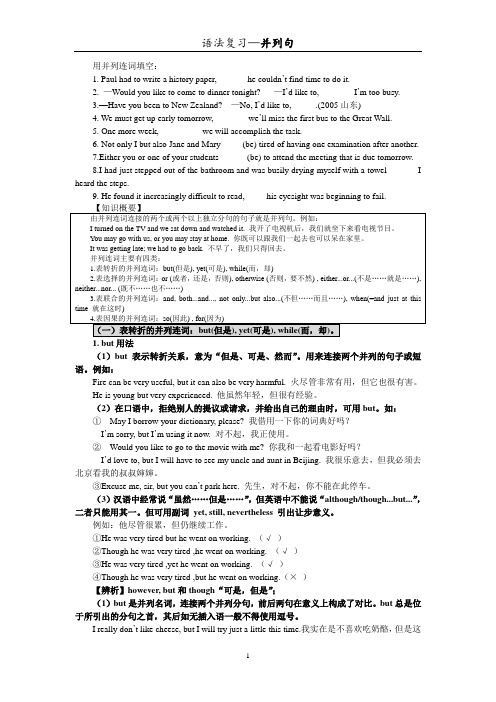
用并列连词填空:1. Paul had to write a history paper, ______ he couldn’t find time to do it.2. —Would you like to come to dinner tonight? —I’d like to, _______ I’m too busy.3.—Have you been to New Zealand? —No, I’d like to, _____.(2005山东)4. We must get up early tomorrow, _______ we’ll miss the first bus to the Great Wall.5. One more week, _________ we will accomplish the task.6. Not only I but also Jane and Mary ____ (be) tired of having one examination after another.7.Either you or one of your students ______(be) to attend the meeting that is due tomorrow.8.I had just stepped out of the bathroom and was busily drying myself with a towel ______ I heard the steps.9. He found it increasingly difficult to read, ____ his eyesight was beginning to fail.1. but用法(1)but 表示转折关系,意为“但是、可是、然而”。
用来连接两个并列的句子或短语。
例如:Fire can be very useful, but it can also be very harmful. 火尽管非常有用,但它也很有害。
高考英语语法复习:简单句、并列句、三大从句及特殊句式
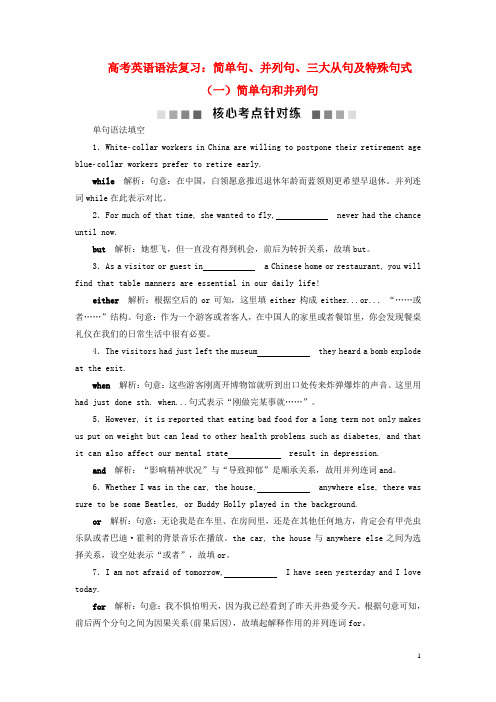
高考英语语法复习:简单句、并列句、三大从句及特殊句式(一)简单句和并列句单句语法填空1.Whitecollar workers in China are willing to postpone their retirement age bluecollar workers prefer to retire early.while解析:句意:在中国,白领愿意推迟退休年龄而蓝领则更希望早退休。
并列连词while在此表示对比。
2.For much of that time, she wanted to fly, never had the chance until now.but解析:她想飞,但一直没有得到机会,前后为转折关系,故填but。
3.As a visitor or guest in a Chinese home or restaurant, you will find that table manners are essential in our daily life!either解析:根据空后的or可知,这里填either构成either...or... “……或者……”结构。
句意:作为一个游客或者客人,在中国人的家里或者餐馆里,你会发现餐桌礼仪在我们的日常生活中很有必要。
4.The visitors had just left the museum they heard a bomb explode at the exit.when解析:句意:这些游客刚离开博物馆就听到出口处传来炸弹爆炸的声音。
这里用had just done sth. when...句式表示“刚做完某事就……”。
5.However, it is reported that eating bad food for a long term not only makes us put on weight but can lead to other health problems such as diabetes, and that it can also affect our mental state result in depression.and解析:“影响精神状况”与“导致抑郁”是顺承关系,故用并列连词and。
高中文言文特殊句式归纳整理

高中文言文特殊句式归纳整理高中文言文特殊句式归纳整理1. 并列句并列句是指由两个或更多单句组成的复句。
在文言文中,这种句式使用非常广泛。
并列句的基本结构为:“句子1,句子2。
”两个句子之间用“,”相连。
例如:诸侯并举,进逼秦境。
天地肆春,百草各秀。
2. 连接句连接句是指把两个或多个单句连接起来,构成一个复句的句式。
在文言文中,连接句也是一种常见句式。
连接句的基本结构为“句子1,(于是)句子2。
”句子1和句子2之间用“,”或“于是”相连。
例如:君子好学,必进于师。
——《论语·为政》优游自在,不求闲静。
——《庄子·逍遥游》3. 并列连接句并列连接句是指由两个或多个句子并列连接而成的句式。
这种句式结构比较复杂,通常会使用一些连词来连接各个句子。
在文言文中,这种句式也非常常见。
并列连接句的基本结构为:“句子1,连词(如而、亦、且等),句子2。
”句子1和句子2之间用连词相连。
例如:《左传·僖公二十四年》:“天不我與,君亦不我與,豈不怨嗟!”(不但天不帮我,君主也不帮我,我怎能不悲伤!)《论语·卫灵公》:“不忠信,人不任也。
”(如果不忠实,就不会受到人们信任。
)4. 倒装句倒装句是指主谓语序颠倒的句式。
在文言文中,倒装句的使用非常广泛。
它具有强调句子中的某一成分的作用,可以增加句子的表现力。
倒装句的基本结构为:“谓语动词(如是、曰、曰是等)+主语+宾语/状语”。
例如:《楚辞·离骚》:“惟江上之清风,与山间之明月,耳得之而为声,目遇之而成色。
”《庄子·逍遥游》:“天地之大也,人犹有所憾。
故至人知无为之有为,不言之有言,无为而有为,矛盾而并存。
”5. 并列倒装句并列倒装句是指由两个或多个倒装句并列连接而成的句式。
这种句式结构比较复杂,但在文言文中也比较常见。
并列倒装句的基本结构为:“谓语动词+宾语1+主语1,连词+谓语动词+宾语2+主语2。
”例如:《庄子·逍遥游》:“肆意而无忧,安而不忘,随时而变古,能因事而制宜。
高三英语语法复习专题---并列句-PPT

3.表示转折,常用的连词有but, while, yet等。 She is seriously ill, but there is hope of
her recovery. It is very good, (but) yet it can be better. Jane was dressed in whitew__h_i_l_e_ Mary was dressed in black.
③Soon they came to a farm house, w__h_o_s_e roof was much higher than oБайду номын сангаасhers.
四 、并列句的结构
1 We fished all day, but (we) didn’t catch a thing.
2 We fished all day; however, we didn’t catch a thing.
The clouds disappeared; the sun shone again.
He was the only candidate; therefore, he was elected.
The composition is all right; however, there is room to improvement.
We wrote to her __a_s__ _w_e_l_l _a_s___ telegraphed her.
3. You are not right. He is not right, either. _N_e_i_t_h_e_r you _n_o_r___ he is right. You are not right ,___n_o_r_/ __n_e_it_h_e_r_ is he. 4. He is happy. His children are also happy. He __a_s__ __w_e_l_l __a_s__ his children is happy. _B_o__th_ he _a_n_d___ his children _a_r_e___ happy. He is happy, and _s_o___ _a_re____ his children. 5. He failed many times, but he didn’t despair. _A__lt_h_o_u_g_h_____he failed many times, he didn’t
特殊形式的句子
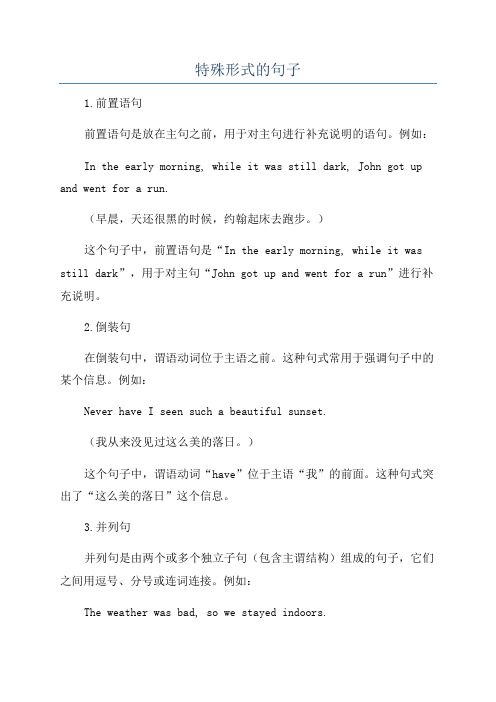
特殊形式的句子1.前置语句前置语句是放在主句之前,用于对主句进行补充说明的语句。
例如:In the early morning, while it was still dark, John got up and went for a run.(早晨,天还很黑的时候,约翰起床去跑步。
)这个句子中,前置语句是“In the early morning, while it was still dark”,用于对主句“John got up and went for a run”进行补充说明。
2.倒装句在倒装句中,谓语动词位于主语之前。
这种句式常用于强调句子中的某个信息。
例如:Never have I seen such a beautiful sunset.(我从来没见过这么美的落日。
)这个句子中,谓语动词“have”位于主语“我”的前面。
这种句式突出了“这么美的落日”这个信息。
3.并列句并列句是由两个或多个独立子句(包含主谓结构)组成的句子,它们之间用逗号、分号或连词连接。
例如:The weather was bad, so we stayed indoors.(天气不好,我们就待在屋子里。
)这个句子中的两个独立子句“the weather was bad”和“we stayed indoors”之间由连词“so”连接起来。
4.从句从句是指能够独立表达完整意思的句子,但是它是另一个完整句子的一部分。
例如:I will study harder if I want to get into a good university.(如果我想进入一个好的大学,我就要更加努力学习。
)这个句子中,“if I want to get into a good university”是一个从句,它是“我会更加努力学习”的条件。
5.独立结构独立结构是指在一个句子中作为补充说明的短语或单词,它不是句子的主干部分,但却对句子的意思有所补充。
中考英语语法之并列句

中考英语语法之并列句并列句是英语语法中重要的一种句子结构。
它通过将两个或更多的独立分句连接,可以有效地提升句子的表达能力和逻辑关系。
在中考英语中,掌握并列句的使用是必不可少的。
本文将详细介绍并列句的定义、分类、使用方法以及一些注意事项。
希望通过本文的阅读,读者能够对并列句有更深入的理解。
一、并列句的定义并列句是由两个或更多的独立分句通过逗号、分号、连词等连接起来的句子。
每个分句都有自己的主语和谓语,它们在结构上平行并列。
并列句可以用于表达并列关系、对比关系、选择关系、因果关系等。
二、并列句的分类1. 逗号连接:在同等重要的两个分句之间使用逗号进行连接,适用于并列关系和对比关系。
例如:- I like swimming, and my brother likes playing basketball.- The weather is hot, but we still decide to go hiking.2. 分号连接:在较长或较复杂的分句之间使用分号进行连接,适用于表示并列关系和选择关系。
例如:- She is good at singing; her sister is good at dancing.- You can go to the supermarket; or you can order food online.3. 连词连接:使用连词(如and、but、or、so等)连接两个具有相似意义的分句。
例如:- I am tired, so I will go to bed early tonight.- Jack is good at math, but he is not interested in English.三、并列句的使用方法1. 并列关系:表示两个或多个相同重要程度的内容并列出现。
例如:- I like apples and bananas.- She is friendly, kind, and helpful.2. 对比关系:表示两个相反或者相对的内容进行对比。
初中文言文特殊句式

初中文言文特殊句式1. 倒装句:把谓语动词放在主语之前的句子结构,例如:"子曰,知者不惑也。
"(孔子说,知道的人不会迷惑。
)2. 比拟句:用"如同","犹如"等词语表示比较,例如:"贪婪之心犹如风中之火。
"3. 并列句:用"与","或"等词语连接两个或多个并列的词、短语、从句,例如:"辛勤劳动,与知识相结合,方能获得成功。
"4. 定语从句:用"之","者","所"等代词引导的修饰性从句,例如:"知识是人类进步的阶梯。
"5. 状语从句:用"因","所以","然则"等引导的修饰性从句,例如:"因为努力学习,所以取得了好成绩。
"6. 反问句:用反问的方式表达疑问、反问的句子,例如:"人生何以为快乐?岂止于富有与权势乎?"7. 折叠句:通过重复的方式表达强调,例如:"文武之道,一张一弛也。
"8. 直接引语:直接引用别人的话语,常用于引述他人的观点或对话,例如:"他说道:“无论经历多少挫折,我都不会放弃。
”"9. 比喻句:用一个物体或事物来比喻另一个物体或事物,例如:"人的一生就像一本书,每一页都记录着不同的经历。
"10. 排比句:通过重复相同结构的句子或短语,形成一种韵律感,例如:"疾风知劲草,板荡识诚臣。
"。
特殊句式 简单句 并列句和复合句

特殊句式一、考点聚焦主谓一致主谓一致就是句子的谓语动词形式在人称和数上必须和句子的主语保持一致,叫主谓一致。
这种关系一般要遵循三个原则:语法上一致的原则;意义上一致的原则和就近一致的原则。
语法上的一致:谓语和主语通常从语法形式上取得一致,主语为单数形式,谓语动词也用单数形式;主语为复数形式,谓语动词也为复数形式。
例如:The boy is clever enough to study maths well. 这个男孩够聪明,可以把数学学好。
Everybody in my class tries to do well in English. 我们班每个人都努力学好英语。
I. 下列情况谓语动词只能用单数:1.不可数名词或可数名词单数作主语,谓语动词用单数形式。
例如:Water is very important to the trees. 水对树来说非常重要。
2. 如果句子的主语是一个抽象的概念,抽象名词,此名词也是不可数名词,谓语动词用单数形式。
例如:Brave is one of his advantages. 勇敢是他的一个优点。
3. 动词不定式或者动名词短语作主语时,谓语动词用单数形式。
例如:To improve your English is the most important work. 提高你的英语是最重要的工作。
Watching TV too much is bad for your eyes. 看电视太多对你的眼睛有害。
4. 不定代词each,one,another,something,somebody,nothing,nobody,everyone,everything,anyone,anything等作主语时,谓语动词用单数形式。
例如:Somebody is waiting for at the gate. 有人在大门口等你。
Nothing is too difficult if you put your heart into it. 世上无难事只怕有心人。
英语并列句与特殊句式

学习专题:并列句、特殊句式Key points:1、并列句:掌握四种并列关系:(1)表递进:and, not only…but also…, neither…nor…(2) 表选择:or, otherwise, or else, either…or…(3)表转折:but, yet, however,while,whereas(4)表因果:so,for2、特殊句式:(1)倒装句:完全倒装、部分倒装(2)强调句:强调句基本句型:It is / was +被强调部分+ that/who + 句子剩余部分谓语的强调(3)反义疑问句:常见句型的反义疑问句(4)祈使句:否定式和强调式(5)感叹句:what 、how 做感叹词1、并列句:1)涵义:两个或两个以上简单句的组成,通过并列连词组成,每个简单句被称作分句。
2)分类:(1)表递进,表示两个同等概念: and, not only…but also…, neither…nor…★He had plenty of money, __________ he spent it freely.★He ____________ gave us a lot of advice, __________ helped us to study English.★I have _______time _____money for skiing .Bonus:★I was just leaving when the telephone rang.____________________________________注: when 作这种用法时,主要用于 was/were doing sth. when sth./sb. did;was/were about to do sth. when sth./sb. did; was/were on the point of doing sth. when sth./sb. did 等句型中,表示“当某人或某物正在或正要做某事,就在这时突然又发生了另一事”。
十五特殊句式及结构
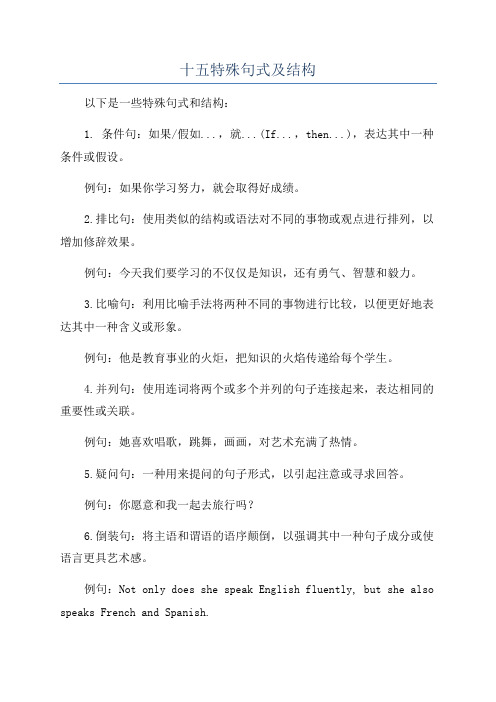
十五特殊句式及结构
以下是一些特殊句式和结构:
1. 条件句:如果/假如...,就...(If...,then...),表达其中一种条件或假设。
例句:如果你学习努力,就会取得好成绩。
2.排比句:使用类似的结构或语法对不同的事物或观点进行排列,以增加修辞效果。
例句:今天我们要学习的不仅仅是知识,还有勇气、智慧和毅力。
3.比喻句:利用比喻手法将两种不同的事物进行比较,以便更好地表达其中一种含义或形象。
例句:他是教育事业的火炬,把知识的火焰传递给每个学生。
4.并列句:使用连词将两个或多个并列的句子连接起来,表达相同的重要性或关联。
例句:她喜欢唱歌,跳舞,画画,对艺术充满了热情。
5.疑问句:一种用来提问的句子形式,以引起注意或寻求回答。
例句:你愿意和我一起去旅行吗?
6.倒装句:将主语和谓语的语序颠倒,以强调其中一种句子成分或使语言更具艺术感。
例句:Not only does she speak English fluently, but she also speaks French and Spanish.
7.强调句:通过使用强调的句式或结构来强调句子中的一些部分,使之在句子中更加突出。
8.反问句:通过提出一个反问来表达其中一种观点或态度,通常不需要得到肯定或否定的回答。
例句:You didn't forget my birthday, did you?
这些特殊句式和结构可以帮助我们更加灵活地表达和交流,增强语言表达的魅力和效果。
超实用高考英语复习:专题07 高频考点并列句、状语从句及特殊句式与语法填空(解析版)
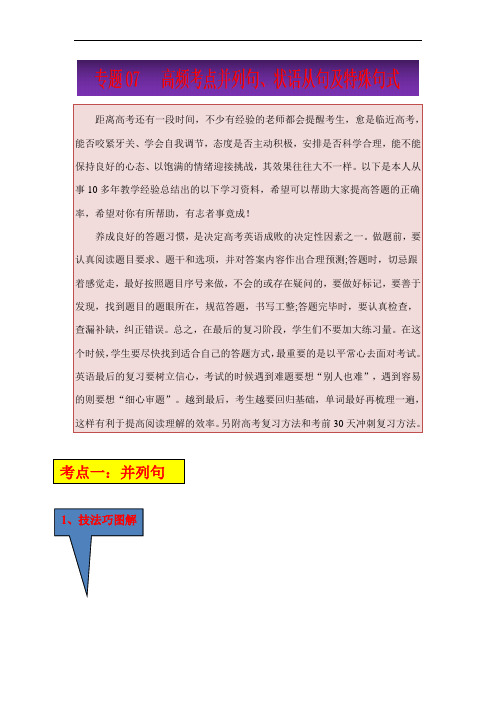
距离高考还有一段时间,不少有经验的老师都会提醒考生,愈是临近高考,能否咬紧牙关、学会自我调节,态度是否主动积极,安排是否科学合理,能不能保持良好的心态、以饱满的情绪迎接挑战,其效果往往大不一样。
以下是本人从事10多年教学经验总结出的以下学习资料,希望可以帮助大家提高答题的正确率,希望对你有所帮助,有志者事竟成!养成良好的答题习惯,是决定高考英语成败的决定性因素之一。
做题前,要认真阅读题目要求、题干和选项,并对答案内容作出合理预测;答题时,切忌跟着感觉走,最好按照题目序号来做,不会的或存在疑问的,要做好标记,要善于发现,找到题目的题眼所在,规范答题,书写工整;答题完毕时,要认真检查,查漏补缺,纠正错误。
总之,在最后的复习阶段,学生们不要加大练习量。
在这个时候,学生要尽快找到适合自己的答题方式,最重要的是以平常心去面对考试。
英语最后的复习要树立信心,考试的时候遇到难题要想“别人也难”,遇到容易的则要想“细心审题”。
越到最后,考生越要回归基础,单词最好再梳理一遍,这样有利于提高阅读理解的效率。
另附高考复习方法和考前30天冲刺复习方法。
考点一:并列句1、技法巧图解2. 高考真题体验1、(2022年新高考I卷)...After a three-year pilot period, the GPNP will be officially set up nextyear. The GPNP is designed to reflect the guiding principle of “protecting the authenticity and integrity (完整性) of natural ecosystems, preserving biological diversity, protecting ecological buffer zones, ______ leaving behind precious natural assets(资产)for future generations”. (用适当的词填空)【详解】考查连词。
语文特殊句式汇总
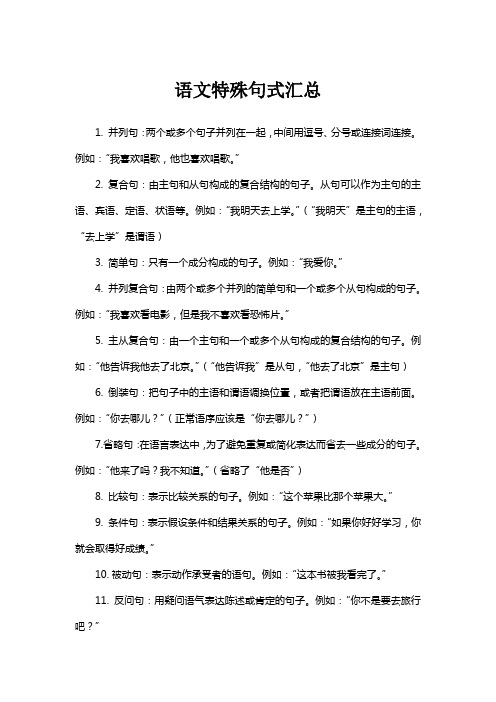
语文特殊句式汇总1. 并列句:两个或多个句子并列在一起,中间用逗号、分号或连接词连接。
例如:“我喜欢唱歌,他也喜欢唱歌。
”2. 复合句:由主句和从句构成的复合结构的句子。
从句可以作为主句的主语、宾语、定语、状语等。
例如:“我明天去上学。
”(“我明天”是主句的主语,“去上学”是谓语)3. 简单句:只有一个成分构成的句子。
例如:“我爱你。
”4. 并列复合句:由两个或多个并列的简单句和一个或多个从句构成的句子。
例如:“我喜欢看电影,但是我不喜欢看恐怖片。
”5. 主从复合句:由一个主句和一个或多个从句构成的复合结构的句子。
例如:“他告诉我他去了北京。
”(“他告诉我”是从句,“他去了北京”是主句)6. 倒装句:把句子中的主语和谓语调换位置,或者把谓语放在主语前面。
例如:“你去哪儿?”(正常语序应该是“你去哪儿?”)7.省略句:在语言表达中,为了避免重复或简化表达而省去一些成分的句子。
例如:“他来了吗?我不知道。
”(省略了“他是否”)8. 比较句:表示比较关系的句子。
例如:“这个苹果比那个苹果大。
”9. 条件句:表示假设条件和结果关系的句子。
例如:“如果你好好学习,你就会取得好成绩。
”10.被动句:表示动作承受者的语句。
例如:“这本书被我看完了。
”11. 反问句:用疑问语气表达陈述或肯定的句子。
例如:“你不是要去旅行吧?”12. 祈使句:表示命令、请求、劝告等的句子。
例如:“请把门关上。
”13. 感叹句:表示强烈感情的句子。
例如:“多么美丽的风景啊!”14. 选择句:表示在两个或更多个事物中做出选择的句子。
例如:“你要喝咖啡还是茶?”15.比较级和最高级:用于比较三个或三个以上的人、物、事情的不同程度。
例如:“这本书比那本书更有趣。
”(比较级),“这是我看过的最好的电影。
”(最高级)。
16. 不定式句:表示未定的行为或状态的句子。
例如:“我要学习英语。
”17. 从属连词:用来引导从句,表达从属关系的词语。
例如:“因为下雨了,所以我没有去上学。
文言文特殊句式专题训练
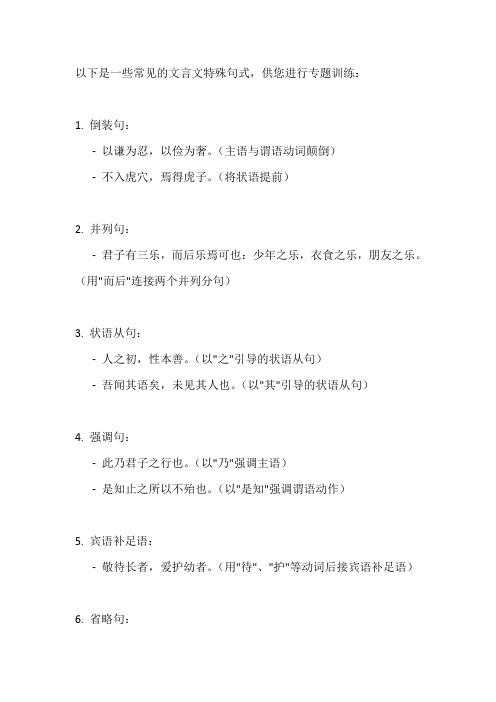
以下是一些常见的文言文特殊句式,供您进行专题训练:
1. 倒装句:
-以谦为忍,以俭为奢。
(主语与谓语动词颠倒)
-不入虎穴,焉得虎子。
(将状语提前)
2. 并列句:
-君子有三乐,而后乐焉可也:少年之乐,衣食之乐,朋友之乐。
(用"而后"连接两个并列分句)
3. 状语从句:
-人之初,性本善。
(以"之"引导的状语从句)
-吾闻其语矣,未见其人也。
(以"其"引导的状语从句)
4. 强调句:
-此乃君子之行也。
(以"乃"强调主语)
-是知止之所以不殆也。
(以"是知"强调谓语动作)
5. 宾语补足语:
-敬待长者,爱护幼者。
(用"待"、"护"等动词后接宾语补足语)6. 省略句:
-上善若水,水善利万物而不争。
(省略了"为"字)
-君子曰:“学而时习之,不亦说乎?”(省略了第二个"为"字)
以上是一些常见的文言文特殊句式,您可以通过研读经典文言文篇章,结合这些句式进行练习和应用。
此外,还可以尝试分析古代文言文作家的写作技巧,进一步提高对文言文特殊句式的理解和运用能力。
祝您学习进步!。
高考英语语法专项并列句详解版

语法专项9 ——并列句【并列句综述】由并列连词(and, but, or等)或分号(;)把两个或两个以上的简单句连在一起构成。
【小叮咛】逗号是不可以连接句子的,这一点和汉语不同。
正:You help him and he helps you. 你帮他,他帮你。
误:The future is bright; the road is tortuous. 前途是光明的,道路是曲折的。
并列句的用法1.表递进关系:用来表递进关系的并列连词有and,not only...but also...,neither...nor...,not...but...等。
例如:He had plenty of money and he spent it freely.他有足够的钱,可以随便花。
Not only did he speak more correctly,but also he spoke more easily.他不仅说得更正确,而且说得更轻松。
【小叮咛】(1)both … and 不能连接分句。
(2)not only … but also …连接两个主语时,谓语动词遵循就近一致原则,也就是说要与靠近but also的那个主语一致。
(3)not only引导的分句位于句首时,其分句要用倒装,而but also引导的分句不倒装。
2.表选择关系:常用的并列连词有or,either...or...,otherwise等。
Either you are right,or I am.要么你对,要么我对。
Don’t drive so fast or/otherwise you’ll have an accident.不要开那么快,否则你会出事的。
3.表转折关系:常用的并列连词有but,yet,still, however, whereas,while, when等。
Jane said she was ill, yet I saw her in the street just now.简说她病了,但刚才我在街上看到了她。
六年级语法复习掌握常用句型

六年级语法复习掌握常用句型六年级语法复习:掌握常用句型在六年级的语法学习中,掌握常用句型是非常重要的一部分。
本文将针对常用句型进行复习,以帮助同学们更好地掌握语法知识。
一、陈述句陈述句是最常见的句子类型,用于陈述一个事实、描述一个状态或表达一个观点。
陈述句的基本结构是主语+谓语+宾语。
1.简单句简单句由一个主语和一个谓语构成,用于表达简单的事实或描述。
例如:- 早晨太阳升起了。
- 猫咪正在睡觉。
2.并列句并列句由两个或多个并列的简单句组成,用连词连接。
并列句可以同时陈述两个或多个相关的事实。
例如:- 我喜欢游泳,他喜欢跑步。
- 你可以选择读书或者看电影。
二、疑问句疑问句用于提问,以询问信息、请求帮助或寻求答案。
疑问句的基本结构是疑问词/助动词+主语+谓语+其他成分。
1.一般疑问句一般疑问句用于询问一个肯定或否定的事实。
在句首添加助动词或疑问词。
例如:- 你喜欢游泳吗?- 他是你的朋友吗?2.特殊疑问句特殊疑问句用于询问具体信息,需要使用特殊疑问词。
例如:- 你喜欢哪种运动?- 你什么时候去了公园?三、祈使句祈使句用于表达命令、请求、建议或邀请。
祈使句的基本结构是谓语+其他成分,省略了主语。
例如:- 快点完成作业。
- 请给我一杯水。
四、感叹句感叹句用于表达惊讶、兴奋、喜悦、惋惜等强烈情感。
感叹句的基本结构是感叹词+谓语+其他成分。
例如:- 多么美丽的花啊!- 真是一个令人难以置信的消息!五、虚拟句虚拟句用于表达与事实相反或假设的情况。
虚拟句的基本结构是虚拟条件+谓语+其他成分。
例如:- 如果我是你,我会更加努力学习。
- 要是明天下雨,我们就不能去郊游了。
六、否定句否定句用于表示否定的意思。
否定句的基本结构是否定词+谓语+其他成分。
例如:- 我不喜欢吃辣的食物。
- 他从不迟到。
需要注意的是,以上介绍的句型只是语法学习的一部分,语言的运用还需要在实际的交流中灵活运用,同时也要注意语句的连贯性和语法的正确性。
高考必备语法——并列句和状语从句

让知识带有温度。
高考必备语法——并列句和状语从句专题3并列句和状语从句一、并列句并列句由两个或两个以上并列而又自立的容易句构成。
在并列句中,这些容易句常由并列连词(短语)连在一起。
注重:when可用作并列连词,相当于and at this/that time,意为“正在这/那时;骤然”,常用于下列句式:sb.be about to do/going to do/on the point of doing sth.when...(某人刚要做某事,骤然……);sb.be doing sth.when ...(某人正在做某事,骤然……);sb.had just donesth.when ...(某人刚做完某事,骤然……)。
He was about to go out when the telephone rang.他刚要出去,电话铃骤然响了。
He had just finished writing a report when the boss let him type a letter.他刚写完一篇报告,老板就让他打印一封信件。
单句语法填空1.At school,some students are active while some are shy,yet they can be good friends with one another.2.The other day I was doing some grocery shopping when a man walked toward a group of us at the checkout stand.3.Follow your doctor’s advice,or your cough will get worse.第1页/共3页千里之行,始于足下4.John plays basketball well,but/yet his favorite sport is badminton.二、状语从句考点一让步状语从句单句语法填空1.The athletes,especially the winners,should remain modest whatever rapid progress they have made.2.Much as/though I have traveled,I have never seen anyone who’s as capable as John. 3.Don’t trust him,no matter what he says.4.While/Although/Though I admit that there are problems,I don’t agree that they cannot be solved. 5.I’ll do it,even if/though it takes me all the afternoon.6.We’ll go on with the work,whether we can find the necessary tools or not.7.No matter how hard the work is,you’d better try to do it well.考点二时光状语从句单句语法填空1.Not until we succeed in letting wildlife live in peace can we smile in relief.2.Air pollution is getting more and more serious,so we must take action before it is too late. 3.He had no sooner finished his speech than the students started cheering.第2页/共3页让知识带有温度。
考点03 并列句(解析版).doc

2020年江苏高考英语一轮考点扫描考点03 并列句一、【知识精讲】(一)概念两个或两个以上的简单句用并列连词连在一起组成的句子,叫做并列句。
基本结构:“简单句+并列连词+简单句”。
并列连词有:and,but,or,so等。
并列句中的各简单句意义同等重要,相互之间没有从属关系,是平行并列的关系。
它们之间用连词连接。
I like action movies but don't like thrillers.Hurry up or you'll be late.and,or和but都是连词,在句中连接两个或两个以上的并列成分。
可连接两个词,两个短语,两个分句,但所连接的两个成分必须一致,绝不能一个是词,一个是句子。
I like red and orange.He isn't my brother or my friend.I like playing football and swimming.and 的意思是“和”,表示前后两个成分的并列或对称关系;or的意思是“或者”、“否则”、“要不然”,表示两个成分并列或选择关系;but 的意思是“但是”,表示两个成分之间的转折关系。
(二)1. 表并列关系的:由and, both...and,as well as, not only...but (also), neither...nor等组成。
She not only sings but also dance.2.表转折关系的:与but, however,while, still,yet等连用。
The film is not perfect,still,it's good.3.表选择关系的:由or, either...or..., not...but..., or else连接Take the chance,or else you will regret it.4.表因果关系的:与for,so/so that,therefore,because等连用。
- 1、下载文档前请自行甄别文档内容的完整性,平台不提供额外的编辑、内容补充、找答案等附加服务。
- 2、"仅部分预览"的文档,不可在线预览部分如存在完整性等问题,可反馈申请退款(可完整预览的文档不适用该条件!)。
- 3、如文档侵犯您的权益,请联系客服反馈,我们会尽快为您处理(人工客服工作时间:9:00-18:30)。
用并列连词填空:1. Paul had to write a history paper, ______ he couldn’t find time to do it.2. —Would you like to come to dinner tonight? —I’d like to, _______ I’m too busy.3.—Have you been to New Zealand? —No, I’d like to, _____.(2005山东)4. We must get up early tomorrow, _______ we’ll miss the first bus to the Great Wall.5. One more week, _________ we will accomplish the task.6. Not only I but also Jane and Mary ____ (be) tired of having one examination after another.7.Either you or one of your students ______(be) to attend the meeting that is due tomorrow.8.I had just stepped out of the bathroom and was busily drying myself with a towel ______ I heard the steps.9. He found it increasingly difficult to read, ____ his eyesight was beginning to fail.1. but用法(1)but 表示转折关系,意为“但是、可是、然而”。
用来连接两个并列的句子或短语。
例如:Fire can be very useful, but it can also be very harmful. 火尽管非常有用,但它也很有害。
He is young but very experienced. 他虽然年轻,但很有经验。
(2)在口语中,拒绝别人的提议或请求,并给出自己的理由时,可用but。
如:①---May I borrow your dictionary, please? 我借用一下你的词典好吗?---I’m sorry, but I’m using it now. 对不起,我正使用。
②---Would you like to go to the movie with me? 你我和一起看电影好吗?---I’d love to, but I will have to see my uncle and aunt in Beijing. 我很乐意去,但我必须去北京看我的叔叔婶婶。
③Excuse me, sir, but you can’t park here. 先生,对不起,你不能在此停车。
(3)汉语中经常说“虽然……但是……”,但英语中不能说“although/though...but...”,二者只能用其一。
但可用副词yet, still, nevertheless 引出让步意义。
例如:他尽管很累,但仍继续工作。
①He was very tired but he went on working. (√)②Though he was very tired ,he went on working. (√)③He was very tired ,yet he went on working. (√)④Though he was very tired ,but he went on working.(×)【辨析】however, but和though“可是,但是”;(1)but是并列名词,连接两个并列分句,前后两句在意义上构成了对比。
but总是位于所引出的分句之首,其后如无插入语一般不得使用逗号。
I really don’t like cheese, but I will try just a little this time.我实在是不喜欢吃奶酪,但是这次我要尝一点。
(2)however是副词,可以位于句首、句中和句末;位于句首时,要用逗号与句子其它部分隔开;位于句中时,其前后都要用逗号;位于句末时其前用逗号分开。
例如:However,they did not seem to have much effect.不过,他们似乎没有起太大的作用。
My father, however, did not agree. 但是,我父亲不同意。
(3)though 用作副词,一般放在句末,意为“可是”、“不过”。
He said he would come, he didn’t, though. 他说他要来,可是并没有来。
翻译:我的房间很小,但却很舒服。
(1)My room is small, ________ it’s comfortable.(2)My room is small. ________, it’s comfortable.(3)My room is small. It’s comfortable, ________.(4)My room is small. It’s comfortable, ________.2. yet的用法yet用作并列连词时,与but一样也主要用于转折,意为“但是”、“然而”。
He said he was our friend, yet he wouldn’t help us. 他说他是我们的朋友,但却不肯帮助我们。
【拓展】(1)yet有时可与并列连词and或but连用,构成习语and yet和but yet,且两者大致同义(均相当于表转折的but)。
She drove very fast to the airport, but /yet/and yet/but yet she missed the plane. 她开快车去机场,可还是误了飞机。
(2)although不能与表示转折的but连用,但是却可以与yet连用。
如:Although we have made some progress, yet we still have a long way to go. 我们虽然取得了些进步,但还是远远不够的。
3.while用法While作并列连词,意为“而;然而”。
表示对比。
如:1.or用法(1)表示选择,意为“或”、“还是”。
连接两个词或两个句子。
谓语动词单、复数采取就近原则。
John or you are in Class Two.约翰或者你在二班。
Are you leaving for Beijing by train or by plane?你是坐火车还是坐飞机去北京?(2)在条件祈使句“祈使句,or+简单句”中,意为“否则”(此时可用or else或otherwise 替换)。
Hurry up, or you’ll be late for school. 赶快,否则你上学就要迟到了。
(3)用于否定句中连结并列成分,表示“和、与”之意。
例如:There isn’t any air or water on the moon.月球上既没有空气也没有水。
【拓展】(1)or 即;也就是(用于补充说明上文内容)。
She studies biochemistry, or the science of life. 她学生物化学,也就是生命科学。
(2)or rather 更确切的说He got home late last night, or rather early this morning. 他昨天半夜里,更确切地说,今天一清早才回到家。
(3)or so 大约;左右(放在量词后)Mr. Smith will be back in a week or so.2.otherwise(“要不然”、“否则”)用法(1) 在虚拟语气句中。
I’m really busy, otherwise(=if I weren’t so busy),I would certainly go with you.我确实太忙了。
不然的话,我一定和你一块去。
We didn’t know you were in trouble at that time,otherwise we would have given you a hand. 我们当时不知道你遇到了困难,要不然我们会帮助你的。
(2) 在条件祈使句“祈使句,otherwise/or/or else +简单句”中。
Hurry up, otherwise you’ll be late. 快点,不然你要迟到了。
Seize the chance, otherwise you will regret it.要抓住机会,否则你会后悔的。
3. either...or...“不是……就是……”。
连接主语时,谓语动词依据就近原则。
Either my father or my brothers are coming. 不是我父亲就是我兄弟要来。
Either we go now or we remain here forever.要么我们现在走,要么我们永远在这呆下去。
4.neither...nor...“既不……也不……”。
连接主语时,谓语动词依据就近原则。
He neither drinks nor smokes. 他既不喝酒也不抽烟。
1.and的用法(1)and作并列连词,意为“和、并且”等。
当连接三个以上的并列成分时,它放在最后一个成分之前,其余用逗号分开,例如:He bought a book and a pen.他买了一本书和一支笔。
Solid,liquid and gas are the three states of matter.固态、液态和气态是物质的三种状态。
(2)在条件祈使句“祈使句,and +简单句”中,表示结果,意为“那么”(暗示一种条件)。
如:Work hard and you’ll pass the examinations (=If you work hard, you’ll pass the examinations). 努力吧,你考试会及格的。
One more step and I will fire. 你再动一步,我就要开枪了。
2. “not only ... but also ... ”意为“不但……而且……”。
可以连接两个词,也可连接两个句子。
其中,but also中的also可以省略。
